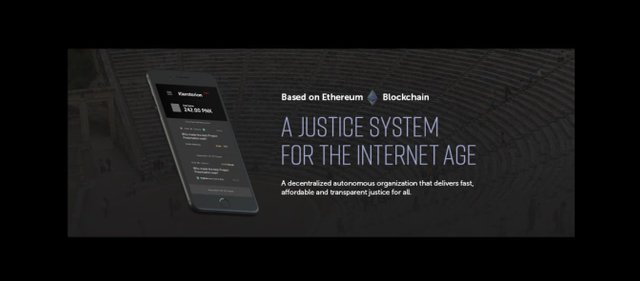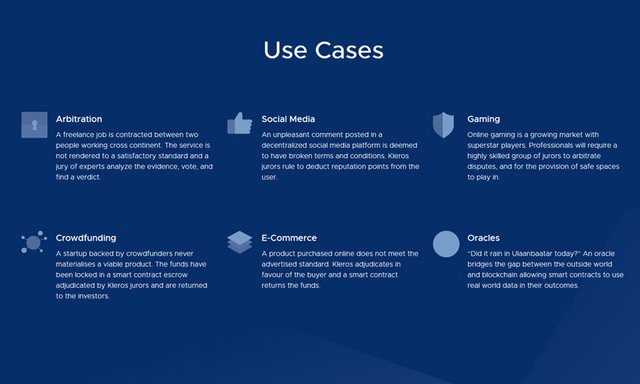Kleros: Resolution of legal Disputes from blockchain
Throughout the initial stages of crowdsale, buyers could bid on tokens or withdraw their offers, which would affect the valuation. If the valuation was higher than the tenderer felt comfortable, an EDCC would automatically cancel the offer and reimburse the money. Or a bidder could simply change his mind and voluntarily withdraw; incurring a penalty based on how much time has elapsed since the offer. (This mechanism would be used to encourage any denial-of-service attack that prevents potential buyers from bidding).
After a pre-set number of blocks, buyers could no longer voluntarily withdraw their offers, although automatic withdrawals based on the current valuation would still be processed. As the authors reasoned, this would prevent the whales from jumping at the last minute and affecting the assessment.
Finally, to encourage early participation and create a liquid market, the interactive currency offer uses an inflation ramp through which the first buyers receive a discount.

And there comes Kleros
"I started thinking about a possibility of distributed justice, I thought about Ancient Greece, about their concept of justice, they did not have lawyers or judges, ordinary citizens had the right to judge a situation, our justice system is from the 18th century and it is to solve problems of that time, it no longer responds to the problems of the globalized world, we started from an idea of crowfunding (crowd funding) to one of crowdjury (crowd justice) Today we have Internet and blockchain to do it ".
Federico Ast. Executive Director of Kleros
Kleros is a decentralized arbitration system that seeks to provide a quick, safe and accessible solution of justice for different types of disputes, in technical and commercial principles.

For example:
Imagine that I am a merchant who hires a designer in another country to develop a website, but he does not comply, I am not going to hire a lawyer there, but if, prior to work, we both agree to do it with this arbitration as a guarantee, Kleros gives the solution to resolve disputes of low amounts.
The startup created a decentralized platform built on the Ethereum that works connecting stakeholders to third parties to arbitrate disputes in all types of contracts, from very simple to highly complex. The result is a dispute resolution system that makes final judgments quickly, cheaply, reliably and decentralized.
Kleros' challenge is to solve the problem of global, digital and decentralized economy disputes that occur in areas where regional courts can not solve them and by existing dispute resolution methods.
The solution developed by them connects users who need to resolve disputes with juries who have the skills to solve them fairly. The resolution layer uses blockchain technology and crowdsourcing juries to judge disputes quickly, safely and easily.

How does Kleros work?
• Contract
Users create an intelligent contract and choose Kleros as their awarding protocol.
• Dispute
The relevant information is sent securely to Kleros.
• Selection
Kleros selects a court composed of experts in the matter in question to judge the dispute (not lawyers or professional judges, but people from the community). The jurors evaluate evidence and vote.
• Request
The decision is applied by the intelligent contract.
For Ast this is to democratize access to justice, make it more accessible and accessible.
"Blockchain brings power to centralized agents, to an institution or a monopolistic company and puts it in the hands of users, for example, imagine a Facebook that does not have an owner, but the users are the owners." At the end of the day Kleros and each proposal that is set up in blockchain is a cooperative with a technology and construction that makes it very reliable and global. "
Crowdsourcing becomes a global group of juries. Blockchain guarantees integrity and transparency in the selection of the jury. The theory of games provides incentives for honest decisions. The Kleros format allows ordinary people to be a judge in a dispute.
For example:
You are in Latin America and want to hire a developer in Africa to make a site. You make an agreement, you pay the value to him, he makes the site, but it does not meet your expectations or the initial premises contracted. You will not go to India to process it for a site of R $ 500.00 or R $ 1,000.00
But imagine this:
Instead of paying it directly, you put the money in a smart contract. And if everything goes well, the money is transferred. But if there is a dispute, the money is locked in the intelligent contract, Kleros selects a jury of experts in disputes of sites, and those guys analyze the evidence and vote on who is well. They charge a fee for that work.
You can also use Kleros in insurance, passages, and e-commerce disputes, among many other small different causes.
The conformation of the Kleros team is an example of the model that preaches: the partners live in Argentina, Portugal and France. A communication manager in Peru, two developers in different cities in the United States, a head of Public Relations in Germany, a head of Design in Slovenia and a community manager in Serbia. "It's the new way to build companies, if you're motivated with what you want to achieve, things work."
The native PNK token
Kleros works as a referee of disputes about transactions, services or basically anything on the Internet, by randomly selecting juries who are specialists and own the project's native token, appropriately called Pinakion (PNK). The PNK token holders are eligible to become juries in disputes initiated by two parties that decide to use Kleros to resolve them. Based on the way the juries vote, PNK holders can earn additional tokens if they judge the dispute correctly, according to their peers.
Conclusion
The vision of Kleros is to build a decentralized network of juries to adjudicate disputes in different industries. In this way, it will become a fundamental part of the infrastructure of the next generation of the Internet.
Kleros can offer a decentralized escape hatch, a method of correcting errors to revoke smart contracts when compliance has become unreasonable. An escape hatch that works without reintroducing arbitrariness and corruption in the system; this will allow the use of smart contracts to be extended to a growing number of industries.
Sourced Consulted
- https://www.lanacion.com.ar/2127112-cinco-argentinos-que-estan-cambiando-vidas-con-tecnologia
- http://startuphunterbr.com.br/kleros-disputas-legais-com-a-utilizacao-de-blockchain/
- https://welcu.com/kawin/meet-up-con-federico-ast
- http://latinoemprendeoficial.com/ico-kleros-construyendo-una-mejor-oferta-de-monedas/
- https://www.bitcoinnews.com.br/bitcoinbrasil/kleros-o-protocolo-da-justica-anuncia-evento-de-token-interativo/
- https://medium.com/kleros/kleros-un-protocolo-de-justicia-para-internet-920c28a588f1
More Information & Resources:
Web – Whitepaper – Youtube – Telegram - Twitter
This post has been submitted for the @OriginalWorks Sponsored Writing Contest!
You can also follow @contestbot to be notified of future contests!
Yeah, definitely sky net.